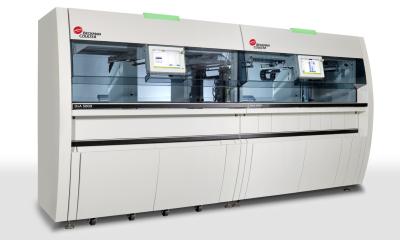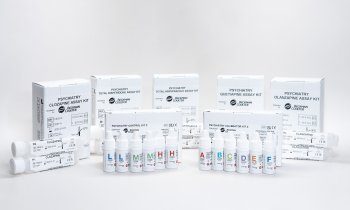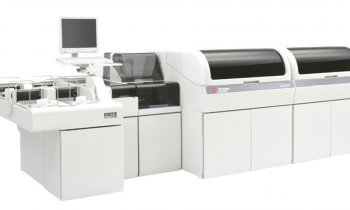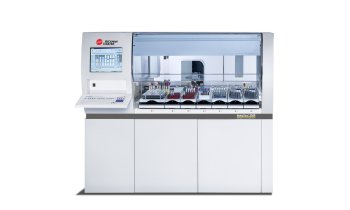Article • High-sensitivity troponin I assay
Speeding up diagnosis of myocardial infarction
The new generation troponin I assay unveiled by Beckman Coulter is helping improve heart attack diagnosis. Delivering high sensitivity, and rapid result turnaround times, every element of the Access hsTnI assay has been redeveloped and updated, including the antibodies and the paramagnetic particles used.
Report: Mark Nicholls
As specialists in developing and manufacturing products that simplify and automate complex medical testing, Beckman Coulter was an early leader in troponin I testing, having launched the first automated troponin assay in 2001. Since then, the product has evolved, with the latest version – the Access hsTnI assay – now able to detect very low levels of troponin and deliver results within 17 minutes.

Kathleen Orland, Senior Vice President and General Manager for Beckman Coulter’s Clinical Chemistry Immunoassay, explained: “We have been through many evolutions to put us at the forefront when it comes to cardiac and troponin testing. “This particular assay provides much greater precision when measuring a very low concentration of troponin and this has been made possible by the next generation of technology that we use.”
Troponin, a protein in muscle fibres that regulate contraction, is a highly-specific cardiac biomarker which is released into the blood soon after the heart is damaged. Troponin blood tests show whether a patient has had a myocardial infarction (MI), with high-sensitivity tests detecting troponin at very low levels, meaning even minor heart damage can be picked up much earlier.
The Access hsTnI assay is a paramagnetic particle chemiluminescent immunoassay for in-vitro quantitative determination of troponin I in serum and plasma samples. It runs on all Beckman Coulter immunoassay analysers in hospital central laboratories, including the benchtop Access 2 (which delivers 100 tests an hour), up to the DXI 800 system, which runs 400 tests per hour. Performance is the same regardless of analyser.

Source: Beckman Coulter
Orland explained that the latest fully-automated assay is a two-step sandwich immunoassay and uses two distinct monoclonal antibodies; the first is the detection antibody, and the second is the capture antibody which is bound to the paramagnetic particle. “The patient sample is aspirated into a reaction vessel then the detection antibody and capture antibody are added to the patient sample and incubated. If troponin is present within the patient sample it will form a bridge between these two antibodies and the reaction is held in a magnetic field and then the unbound materials are washed away,” she added. “We add a chemiluminescent substrate to generate light and the amount of light that is produced is directly proportional to the amount of troponin present in the sample.”
The antibodies selected and the epitopes they recognise on the troponin molecule are unique elements of this new immunoassay, driving its underlying analytical and clinical performance. Orland continued: “The fact that it can detect very low levels precisely is very important and is due to the antibody selection and the new paramagnetic particle we use in this assay, which has a very smooth uniformed surface which also reduces its susceptibility to interferences caused by non-specific binding.”
Speed is crucial in detecting MI when a patient presents at the ED with chest pain, in order to prevent further heart muscle loss and begin effective treatment promptly. As well as indicating if a patient has had a MI, the troponin I test can also rapidly rule that out and reassure patients they have not had a heart attack. Orland points out: “Physicians can safely rule out MI in up to 60% of chest pain patients within a few hours of drawing a sample using our high sensitivity troponin I assay. Therefore, the hsTnI not only benefits overall patient care but also improves the ED workflow, leading to reduced waiting times, and allowing physicians to focus on patients that truly need their attention.”
Being included in the NICE and ESC guidelines really speaks to the quality and efficacy of the assay from both an analytical and clinical standpoint
Kathleen Orland
In the UK, the National Institute for Health and Care Excellence (NICE) has recently published guidance on high-sensitivity troponin tests for the early rule out of non-ST-segment elevation myocardial infarction (NSTEMI) and recommends the use of high-sensitive troponin assays, such as Beckman Coulter’s Access hsTnI. The guidance also references the 2020 European Society of Cardiology (ESC) guidance, where high-sensitivity cardiac troponin tests with validated 1h and 2h algorithms are now cited as a Class I recommendation for diagnosis using rapid ‘rule-in’ and ‘rule-out’ algorithms. “Being included in the NICE and ESC guidelines really speaks to the quality and efficacy of the assay from both an analytical and clinical standpoint,” she said.
Beckman Coulter’s Access hsTnI high-sensitivity immunoassay has been evaluated and validated by a range of internal and external scientific studies and clinical trials, and performance has been further evaluated independently by investigators worldwide. Orland added: “We continue to make investments in these large real-world observational trials to both further evaluate and demonstrate the advantage of the AMI algorithm.”
Study findings reflected on the “excellent analytical sensitivity” of the Access hsTnI assay and remarked on its “significantly improved” analytical sensitivity parameters. “We were the first company to develop and commercialise an automated troponin I assay back in 2001 and have a significant amount of history and research that backs performance of troponin I,” she said, “so this is our legacy and we continue to invest in troponin I.”
Beckman Coulter is now developing next generation systems to offer “significantly faster turnaround times than the current 17 minutes,” as the company’s troponin I evolution continues.
Profile:
Kathleen Orland is Senior Vice President and General Manager for Beckman Coulter’s Clinical Chemistry Immunoassay (CCIA) business unit, leading product strategy and new product development programs across eight global sites. She joined Beckman Coulter in 2005 as a Senior Product Manager for Immunoassay. With a bachelor’s degree in microbiology from the University of Illinois at Urbana-Champaign, she and earned her Medical Technologist MT(ASCP) credential from NorthShore University HealthSystem in Evanston, Illinois.
23.11.2020











